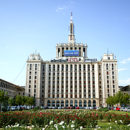
Life is about constantly trying to find an equilibriun
“Sometimes I wonder if perhaps I am a slightly ridiculous person or an anachronism”, Marina Sturdza said to me at the end of a long interview. A question that depicts a curious insecurity for such an accomplished woman – internationally renowned journalist, vice-president of a famous fashion house, UNICEF executive, organizer of major international investment summits, patron and host of charity balls that have raised millions of euros for Romanian children and cancer patients. But Marina Sturdza’s concern is justified by the fact that she has chosen to swim against the tide, in a world where everyone chases money, fame or power. A princess by birth, she has earned respect by virtue of her hard work and discretion, and has earned a reputation that is entirely ridicule proof. Not just princess, but Lady Marina Sturdza.
What would be the definition of a good interview?
Discovering and revealing something that hasn’t already been analyzed a thousand times, allowing the subject to express something that is a personal passion. When, after the article appears, the subject tells me “That’s accurate, that’s me”. I don’t like the type of journalism where you try to trap people; I prefer the exact opposite: to allow my subjects to express themselves, to try to motivate them to explore new themes.
Any good interviews you remember?
I particularly remember some with Karl Lagerfeld. He is a designer, but a passionate, erudite man in all domains, he has a labyrinthine mind, extremely well informed, a real Renassaince man. Sometimes, the best interview is not when we meet for the first time, but the second or third. I often did different interviews with the same person, for different magazines. That’s how we established a more profound dialogue and a level of trust. I always tried to establish a relationship and to show true interest in my subject. I find it incredibly careless when someone comes to interview me and he or she didn’t even bother to look up the topic we are discussing.
So, what did you get from Lagerfeld?
He is a person with a great sense of humor and I got some interesting reactions and emotions. Behind the intellectual armour he wears, he’s a man of tremendous intelligence and sensitivity but whose feelings can be hurt too. It was a particular occasion when he was very upset and refused to talk to anyone else, but accepted to talk to me for an interview. His anger was justified: it had been a kind of Oscar ceremony for fashion had taken place, a complete commercial farce, and he felt ill-used. He was right to feel so. Another interview I particularly remember also comes from the world of fashion. It was an interview with Giorgio Armani, when his life partner had passed away and I was in Milan with a television crew. It had been scheduled for months, but then his partner died and he refused to give any interviews. I asked his personal assistant if I could speak to him myself. Knowing that I had brought an entire team, at great expense, she said “Yes”. Armani consented to do the program, which surprised everyone. It was very interesting because nobody was talking to him about the single most important thing in his life: the death of his best friend, his life and business partner; they were all completely avoiding the subject. And so he and I talked about it, camera rolling, and I could see the PR in the back saying “Cut! Cut! Cut!”, but he wanted to talk, so we continued the interview that lasted a very long time. A few weeks later they contacted me, asking for the film. I sent them the very short fragment which we had cut for a Canadian television channel, judging that there were many personal issues and that much of it had been a private conversation; I also sent them the entire un-cut film. They thanked me, and that was it. I believe a journalist has the responsibility to respect certain limits and not disclose information that is really confidential.
Isn’t it a violation of the rule that says that the main duty of a journalist is to serve the reader’s interest?
No. Some things are truly personal and they don’t serve anyone’s interest. Being a public person doesn’t mean that absolutely everything about you must be public. You still have the right to some privacy. It may be an old journalistic principle, but it is still useful. It is called “Roosevelt’s wheelchair”. You never saw his atrophied legs. You knew he was paralysed, you had pictures of him in his wheelchair, usually his torso, but you never saw the legs.
You still had the camera running with Giorgio Armani. Was he aware of this?
Of course he knew. He knew perfectly well, but he ignored it.
And he talked? He did. He was fully aware of what was happening.
You would have been covered if the whole interview had been broadcasted.
Yes, but I would have never done that.
Why not? Wouldn’t it have been a journalistic hit?
Full Interview








